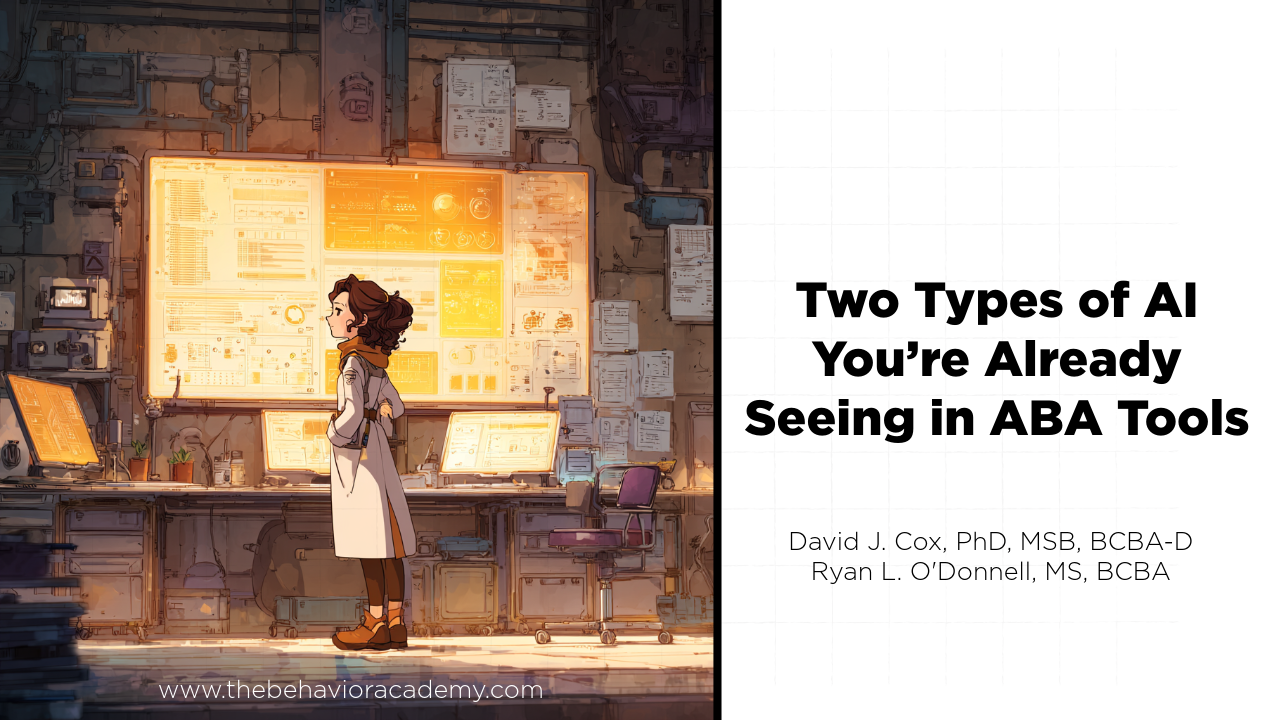Why Every Behavior Analyst Needs AI Literacy Now

Artificial intelligence (AI) has moved from abstract theory to everyday practice with startling speed. From automated documentation in clinics to large language models (LLMs) embedded in electronic health record systems, behavior analysts are already surrounded by AI-driven tools. Whether we recognize it or not, AI has entered our workflows, our decision-making processes, and even the ethical dilemmas we face as practitioners.
For Board Certified Behavior Analysts (BCBAs), Registered Behavior Technicians (RBTs), and behavior-analytic faculty, the question is no longer if AI will affect our work but how well prepared we are to engage with it. And preparation, in this case, means AI literacy.
Drawing on insights from Dr. David J. Cox’s 2025 publication titled “Ethical Behavior Analysis in the Age of Artificial Intelligence (AI): The Importance of Understanding Model Building while Formal AI Literacy Curricula are Developed”, Cox (2025) makes the case that AI literacy is not optional; r...
Behind the Wrapper: What You Need to Know About LLM-Powered Tools

This blog is a sample of our weekly newsletter, designed for ABA professionals who are building AI literacy skills. Subscribe here. Every week, we break down the foundational knowledge BCBAs and others in applied behavior analysis need to make informed decisions about the AI tools flooding our field.
Behind the Curtain of AI Tools in ABA: What Every BCBA Needs to Know
Artificial intelligence is showing up everywhere, from session note summarizers to treatment plan generators, and many of these tools are being marketed directly to behavior analysts. Some claim to reduce clinical workload. Others say they help ensure compliance or automate decision-making. But how many of these tools are actually safe, secure, and appropriate for clinical use in applied behavior analysis (ABA)?
In this blog, we crack open the shiny shell and peek underneath the hood. Because when a tool claims to “use AI”, what that may mean is simply this: take your input (e.g., session notes, SOAP templates, behav...
Understanding the Difference Between Generative and Discriminative AI—and Why It Matters in ABA

You don’t need to understand algorithms or advanced math to get value from this blog. What you do need is a working understanding of what these systems do, how they behave in practice, and where they can help, or harm, your work.
As artificial intelligence (AI) continues to reshape clinical, educational, and organizational settings, professionals across the behavioral sciences, particularly Board Certified Behavior Analysts (BCBAs), face increasing pressure to evaluate and implement these technologies ethically and effectively. But not all AI is built the same. Some systems generate new content; others categorize and predict outcomes based on existing data. These differences matter deeply for clinical utility, ethical decision-making, and the design of workflows in applied behavior analysis (ABA).
To engage with artificial intelligence responsibly, behavior analysts must first understand the difference between generative and discriminative models. Knowing this distinction isn’t just ...
Beyond Baer, Wolf & Risley: The Nuanced History of ABA
If you ask most people where Applied Behavior Analysis (ABA) began, they’ll point to Baer, Wolf, and Risley’s 1968 article—the one that defined the field’s seven core dimensions. But here’s the twist: ABA didn’t start there. The real story is more complex, more fascinating, and—like all good stories—it challenges what we think we know.
Storytelling isn’t just an art; it’s a science of behavior change. A well-told story functions like a structured sequence of verbal behavior, carefully shaping the listener’s understanding, beliefs, and actions. In behavior analysis, storytelling does more than entertain—it educates, persuades, and transforms. It helps us make sense of history, recognize the patterns that led to major breakthroughs, and understand why the field evolved the way it did.
So, what’s the real story of ABA’s origins? To get there, we need to go beyond Baer, Wolf, and Risley and look at the pioneering work that came before them—the research programs, the key figures, and the...
The Morningside Model of Generative Instruction: Transforming Education for the Forgotten 40%
Kent Johnson, PhD: The Founding of Morningside Academy
Dr. Kent Johnson is a renowned educator and researcher in the field of education, particularly known for his work in instructional design, applied behavior analysis (ABA), and precision teaching. As the founder and executive director of Morningside Academy, Dr. Johnson has dedicated his career to developing and refining effective instructional methods that help students who have struggled in traditional educational settings. His expertise and contributions have shaped The Morningside Model of Generative Instruction, a scientifically driven framework that has impacted countless students and educators across North America. Morningside Academy continually refines its teaching methods based on empirical evidence. Through ongoing assessments and research partnerships, the school ensures that its instructional practices remain at the cutting edge of educational science. This commitment to evidence-based instruction is a key reason why M...
Kent Johnson, PhD: Revolutionizing Education Through The Morningside Model of Generative Instruction
Introduction to Kent Johnson, PhD
Kent Johnson, PhD, has dedicated his life to transforming education through his innovative approach to learning known as The Morningside Model of Generative Instruction. As the Founder and Executive Director of Morningside Academy in Seattle, Washington, Kent Johnson, PhD, has fundamentally reshaped how struggling students can become agile, independent learners. His visionary methods, initially developed from his childhood curiosity about learning, have become central not only to the Academy’s ongoing success but also to behavioral science education. This article explores Kent Johnson, PhD's inspiring journey and his impactful contributions, giving you a peek into the profound new course on The Behavior Academy's called "The Morningside Model of Generative Instruction" empowering educators worldwide
Early Life and Inspiration
Kent Johnson, PhD, discovered his passion for teaching early, driven by his curiosity about how learning occurs, particularly...
BCBA CEUs Online Courses & Information Available

As a Board Certified Behavior Analyst (BCBA®) with over 12 years of experience, I have had the privilege of creating over 200 hours of online video content with some of the best behavior analysts in the world, including Patrick C. Friman, Susan M. Schnieder, Steven C. Hayes, Susan G. Friedman, Gregory P. Hanley, and many more. This article aims to provide comprehensive information about BCBA® CEUs (Continuing Education Units), including how to earn them, the topics covered, and the renewal process.
BCBA CEUs Online Courses
The Behavior Academy was founded in 2019 by Ryan O’Donnell, MS, BCBA® a behavior analyst and videographer who goes on-location to bring high-quality continuing education and entertainment to human service professionals. The Behavior Academy has over 100 hours of BCBA® online CUEs that often are referred to as “refreshing” and “enlightening” given the care for quality of content. Just see the inaugural film, This Way of Thinking starring Patrick C. Friman of Boys To...

